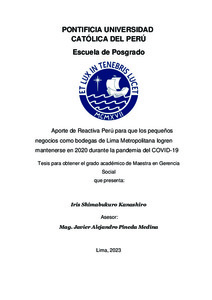| dc.contributor.advisor | Pineda Medina, Javier Alejandro | |
| dc.contributor.author | Shimabukuro Kanashiro, Iris | |
| dc.date.accessioned | 2024-01-23T16:45:55Z | |
| dc.date.available | 2024-01-23T16:45:55Z | |
| dc.date.created | 2023 | |
| dc.date.issued | 2024-01-23 | |
| dc.identifier.uri | http://hdl.handle.net/20.500.12404/26895 | |
| dc.description.abstract | La presente investigación analiza en qué medida el programa Reactiva Perú ha
contribuido a que los pequeños negocios que atienden directamente al público se
mantengan durante la pandemia de la enfermedad por coronavirus (COVID-19). Se
analiza específicamente los casos de las bodegas en Lima Metropolitana en el año
2020.
El objeto de estudio (las bodegas) se enfoca en uno de los sectores más afectados
por la pérdida de empleo, que es el comercio, que tuvo una reducción de 633 mil
empleos (el segundo después de servicios).
Las bodegas atienden a la población de menores recursos y están insertas en la
dinámica local (barrio). Durante la pandemia de la COVID-19, cumplieron un rol
importante al brindar atención durante el periodo más difícil de la crisis, proveyendo
de productos de primera necesidad de la población. Se resalta, además, que más del
70% de las bodegas son conducidas por mujeres.
El objetivo de la presente investigación es conocer el aporte del programa Reactiva
Perú, para que los pequeños negocios como las bodegas en Lima Metropolitana se
logren mantener en el 2020 durante la pandemia del COVID-19. Se analizan los
mecanismos de difusión que se utilizaron, el acceso a la liquidez por parte de las
bodegas, el uso de las herramientas tecnológicas y la percepción de los principales
actores.
Este análisis nos permite proponer medidas de mejora que fortalecerán la
implementación del programa Reactiva Perú. Se formulan recomendaciones para
mejorar la eficacia de los instrumentos de política aplicados para contrarrestar los
efectos de la pandemia. Además, se presentan recomendaciones para potenciar los
resultados en las MYPEs, estrato empresarial cuya relevancia está asociada a su
peso gravitante en el ámbito empresarial y en la generación de empleo. De esta
forma, la presente investigación responde a uno de los grandes retos de la
investigación en Gerencia Social relacionado con el desarrollo endógeno del país. | es_ES |
| dc.description.abstract | This research analyzes to what extent the Reactiva Peru program has helped small
businesses that directly serve the public to maintain themselves during the -19
pandemic. The cases of the grocery stores in Metropolitan Lima in the year 2020 are
specifically analyzed.
In terms of relevance, the object of the study (grocery stores) focuses on one of the
sectors most affected by the loss of employment, which is commerce, with a reduction
of 633 thousand jobs (the second after services).
Added to all this is the fact that the grocery stores serve the population with fewer
resources and are inserted in the local dynamics (neighborhood), having played an
important role during the Covid-19 pandemic, by providing care during the most
difficult period of the crisis, providing basic necessities for the population. Last but not
least, is the fact that more than 70% of the grocery stores are manage by women.
The objective of this research is to know the contribution of the Reactiva Peru
program, so that small businesses such as grocery stores in Metropolitan Lima can
maintain themselves in 2020, during the COVID-19 pandemic, analyzing the
dissemination mechanisms that were used, access to liquidity by grocery stores, the
use of technological tools and the perception of the main actors, to propose
improvement measures that strengthen their implementation, which It will allow us to
formulate recommendations to improve the effectiveness of policy instruments such
as Reactiva applied to counteract the effects of the pandemic, and enhance the
results in MYPEs, a business stratum whose relevance is associated with its
gravitating weight in the business fabric and in the generation of employment, thus
responding to one of the great challenges of research in Social Management related
to the endogenous development of the country. | es_ES |
| dc.language.iso | spa | es_ES |
| dc.publisher | Pontificia Universidad Católica del Perú | es_ES |
| dc.rights | info:eu-repo/semantics/openAccess | es_ES |
| dc.rights.uri | http://creativecommons.org/licenses/by/2.5/pe/ | * |
| dc.subject | Pandemia de COVID-19, 2020---Aspectos económicos--Perú--Lima | es_ES |
| dc.subject | Reactivación económica--Perú--Lima | es_ES |
| dc.subject | Comercio minorista--Perú--Lima | es_ES |
| dc.title | Aporte de Reactiva Perú para que los pequeños negocios como bodegas de Lima Metropolitana logren mantenerse en 2020 durante la pandemia del COVID-19 | es_ES |
| dc.type | info:eu-repo/semantics/masterThesis | es_ES |
| thesis.degree.name | Maestro en Gerencia Social | es_ES |
| thesis.degree.level | Maestría | es_ES |
| thesis.degree.grantor | Pontificia Universidad Católica del Perú. Escuela de Posgrado. | es_ES |
| thesis.degree.discipline | Gerencia Social | es_ES |
| renati.advisor.dni | 29654086 | |
| renati.advisor.orcid | https://orcid.org/0000-0002-7060-1384 | es_ES |
| renati.author.dni | 07363564 | |
| renati.discipline | 314127 | es_ES |
| renati.juror | Vargas Torres, Jorge Ernesto | es_ES |
| renati.juror | Pineda Medina, Javier Alejandro | es_ES |
| renati.juror | Zúñiga Loayza, Cesar Hernán | es_ES |
| renati.level | https://purl.org/pe-repo/renati/level#maestro | es_ES |
| renati.type | https://purl.org/pe-repo/renati/type#tesis | es_ES |
| dc.publisher.country | PE | es_ES |
| dc.subject.ocde | https://purl.org/pe-repo/ocde/ford#5.02.04 | es_ES |







